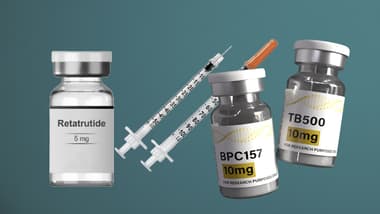Do Collagen Supplements Work? What Independent Research Shows
Despite aggressive marketing claims, high-quality independent studies generally find no consistent, clinically meaningful benefit of oral collagen for skin or joints.
Despite aggressive marketing claims, high-quality independent studies generally find no consistent, clinically meaningful benefit of oral collagen for skin or joints.

TL;DR: High-quality research shows collagen supplement benefits are mostly marketing hype.
Jump to sections:
Collagen supplements have recently exploded into a multi-billion-dollar industry, with influencers and companies making bold claims about skin rejuvenation, joint health, and muscle recovery. But when we dig into the actual science, especially the highest quality, unbiased studies, a very different picture emerges.
A recent meta-analysis published in the American Journal of Medicine examined 23 randomized controlled trials involving 1,474 participants to determine collagen's effects on skin aging. At first glance, the results seemed promising; collagen supplements appeared to improve skin hydration, elasticity, and reduce wrinkles.
But here's where things get interesting, and concerning.
The Funding Source Problem
When researchers separated studies by who funded them, a different pattern emerged:
This isn't necessarily indicative of deliberate manipulation, but it raises serious questions about potential bias in study design, participant selection, outcome measurement, or result interpretation.
The Study Quality Problem
The researchers also analyzed studies by methodological quality: factors like proper randomization, blinding of participants and researchers, and appropriate statistical analysis. The results were telling:
The Sensitivity Analysis Problem
When researchers performed sensitivity analysis (this means removing each study one at a time to see if results still hold up), they found that a single outlier study showing extreme benefits was skewing the entire meta-analysis. Removing that one study led to collagen benefits reducing drastically.
"However, in the sensitivity analysis, excluding outlier studies showing an extreme beneficial effect, collagen supplements showed no significant improvement of wrinkles and a decreased effect for hydration and elasticity."
The results of the studies are not surprising, considering how protein digestion functions. When you consume collagen protein, whether as a powder, pill, or collagen drink, your digestive system doesn't just shuttle it directly to your skin or joints.
During digestion, collagen gets broken down into its constituent amino acids, the same process that happens with any protein you eat. These individual amino acids then enter your bloodstream, where your body can potentially use them to synthesize various proteins, including collagen. However, just because you consume more collagen doesn't mean your body will automatically produce more collagen tissue.
Think of it this way: owning more books doesn't automatically make you more knowledgeable. You still need to read and process them. Similarly, consuming collagen doesn't directly translate into more collagen in your body; it is broken down into amino acids, and your body allocates those according to physiological demand.
Collagen has a relatively poor essential amino acid profile compared with other animal proteins, notably low in tryptophan and leucine. According to the Protein Digestibility-corrected Amino Acid Score (PDCAAS), collagen is classified as an incomplete protein because it lacks tryptophan, an essential amino acid. Beyond this fundamental deficiency, collagen is notably low in other essential amino acids, particularly the branched-chain amino acids, and especially leucine, the primary amino acid responsible for stimulating muscle protein synthesis.
Research from Luke Van Loon's laboratory, one of the world's leading protein metabolism research centers, has consistently shown that collagen supplementation does not increase connective tissue synthesis rates. For instance, this 2023 study published in Medicine & Science in Sports & Exercise directly compared collagen protein to whey protein in 45 recreational athletes following resistance exercise.
The results showed:
So, even without considering the joint and skin aspects, collagen offers less effective muscle-building benefits compared to higher-quality proteins like those discussed in our plant vs animal protein comparison.
Many collagen products are marketed as creams or topical treatments. This approach faces a fundamental biological barrier: collagen molecules are too large to penetrate the skin effectively. Even as tripeptides, they can typically reach only the outermost layer of the epidermis, but still do not get directly integrated into the skin's collagen framework. The dermis typically allows only small molecules to pass through, and collagen proteins are far too large to make this journey.

For topical products to be effective, they need to deliver active compounds that can actually reach their target tissues. Collagen creams are more likely to provide temporary surface moisturizing effects rather than any deep structural benefits.
In science, replication is everything. If an effect is real and meaningful, it should be consistent across different studies, different populations, and different methodological approaches. For collagen supplementation, this consistency is notably absent.
When we look at the highest quality evidence (studies that are properly funded, well-designed, and methodologically sound), benefits seen in some trials are not consistently replicated in higher-quality independent studies. This pattern strongly suggests that the positive results seen in some studies are more likely due to study limitations, bias, or statistical artifacts rather than genuine biological effects.
Rather than relying on expensive collagen supplements of questionable effectiveness, consider evidence-based approaches to supporting skin and connective tissue health:
For Skin Health:
For Connective Tissue and Joint Health:
For Fitness Goals:
The research findings are especially relevant for Kenyan supplement buyers, where collagen products are increasingly marketed through social media platforms like TikTok and Instagram.
Cost Reality Check: Premium collagen supplements in Kenya often cost KSh 3,000-8,000 per month. Given the limited evidence for benefits, this represents poor value compared to proven alternatives like high-quality whey protein (KSh 6,000-7,200 monthly for superior muscle-building results) or simply focusing on affordable local protein sources.
Local Alternatives That Work: Instead of expensive collagen powders, Kenyans can support natural collagen production through:
The Marketing Reality: With Kenya's growing supplement market, collagen products are heavily promoted online. Remember that social media testimonials aren't scientific evidence, and the most expensive option isn't necessarily the most effective.
For most Kenyans, investing in proven basics—quality nutrition, sun protection, and regular exercise—provides better results than expensive supplements with questionable benefits.
Continue reading with these related fitness and health articles




Join the conversation!
Share your thoughts on "Do Collagen Supplements Work? What Independent Research Shows" below.